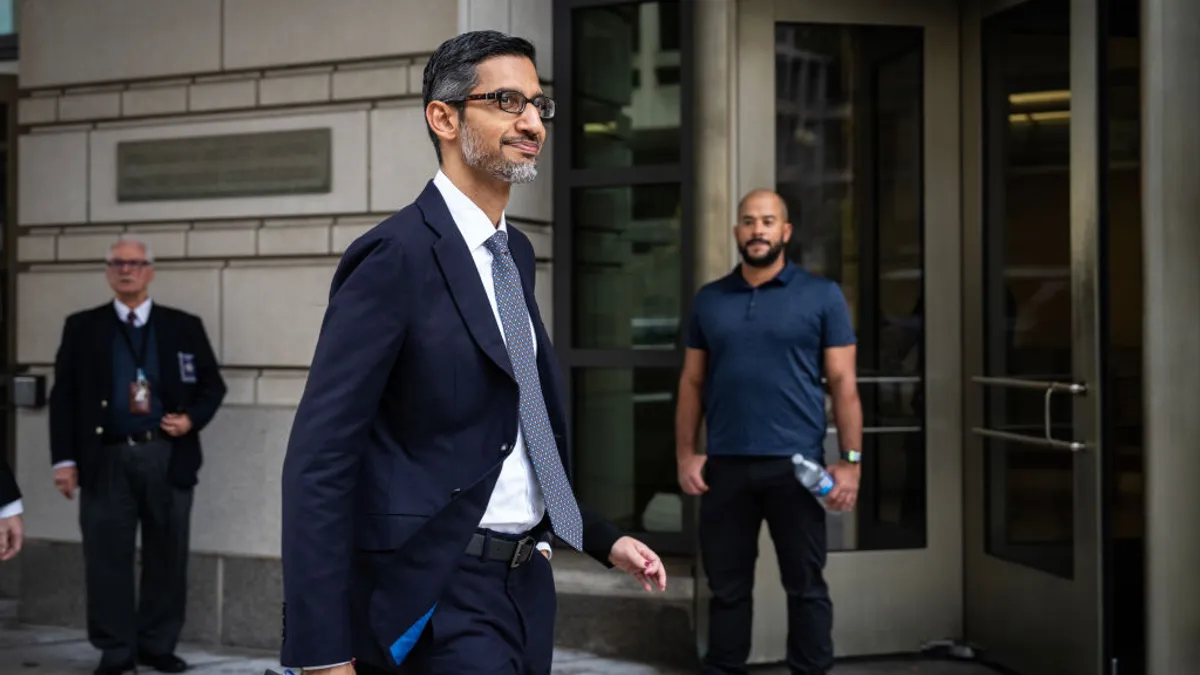Tech giant Google is preparing for a long fight after its loss to the federal government over what a court called its monopolistic search and ad-search practices, the company’s CEO Sundar Pichai said in a Bloomberg video last week.
“We will appeal, and this process will likely take many years,” Pichai said on the David Rubenstein show. “I’m confident, given that we are focused on innovating in the use of technology, we’ll do well in the long run.”
A federal district court in August found Google violated Section 2 of the Sherman Antitrust Act for agreements it entered into with Apple, Samsung and other companies that give it exclusive rights to have its search app pre-loaded onto their devices.
The Department of Justice, which brought the case, said in a filing to the court earlier this month that it’s considering recommendations that would break up the company to stop it from dominating search again despite its court loss.
“Plaintiffs have a duty to seek — and the Court has the authority to impose — an order that not only addresses the harms that already exist as a result of Google’s illegal conduct, but also prevents and restrains recurrence of the same offense of illegal monopoly maintenance going forward,” DOJ said in its October 8 filing.
Google has said it will push back against any proposal to break it up.
“The government seems to be pursuing a sweeping agenda that will impact numerous industries and products, with significant unintended consequences for consumers, businesses and American competitiveness,” Lee-Anne Mulholland, Google’s vice president of regulatory affairs, has said. “This case is about a set of search distribution contracts.”
Court success
Google is starting to see courts rethink the aggressive approach governments have taken against the company, Pichai said.
Last month, the EU’s top court scrapped a $1.7 billion fine imposed on the company by the European Commission for its search dominance on the grounds that the commission failed to take into account all the factors that went into Google’s search performance.
“Just last week there was a European court ruling that overruled the earlier decision,” Pichai told Rubenstein, referencing that top court decision. “But the process took almost 10 years straight, so these things take a while.”
The company is also appealing other antitrust fines it received in the EU.
The case against the company for its search and ad-search dominance is just one of a handful of antitrust cases Google is fighting or has fought in the U.S. and Europe. In January, DOJ filed a case against it for the anti-competitive ad-bidding platform it provides companies. The case is still in pretrial discovery. And Google lost a case last year when a jury found its Play store constituted an unlawful monopoly.
In all of these cases, judges and prosecutors have taken Google to task for what they say is the company’s bad faith effort to hide emails and other internal communications from discovery. In the ad-bidding platform case, for example, U.S. District Court Judge Leonie Brinkema blasted the company for its “absolutely inappropriate and improper” legal hold policies. And DOJ in the Play store case accused the company of deliberate spoliation of evidence.
In his remarks to Rubenstein, Pichai insisted the company has approached the cases in good faith. “We’ve always engaged very respectfully and responsively through these processes,” he said.











